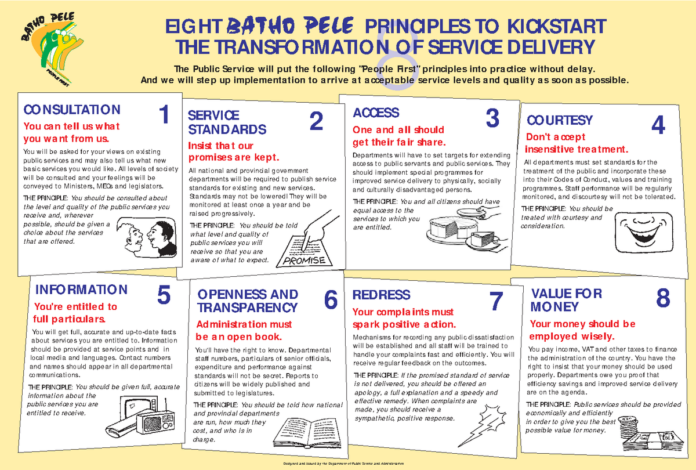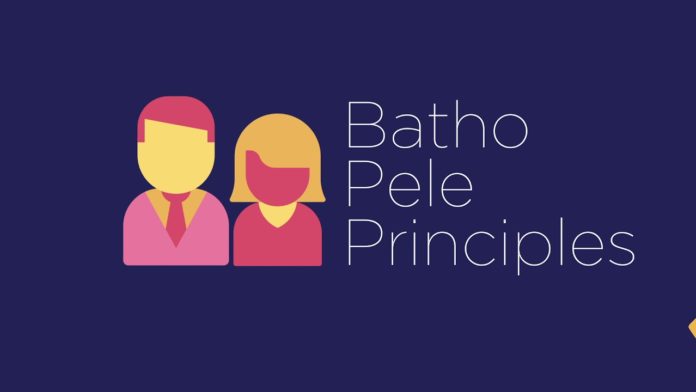It is the right of every citizen to be treated with dignity and respect in South Africa. The people are also entitled to receive honorable treatments and excellent services from the public service sector. The 8 Batho Pele principles are the vehicles through which these guidelines are implemented and their implementation is considered compulsory for all departments in public service. The public service sector is expected to render quality assistance and also put the people first before any other thing. The primary aim of the Batho Pele principles is to ensure every South African citizen has a better life.
All You Need To Know About Batho Pele Principles
The Batho Pele Principle is a political initiative initiated on October 1, 1997, by the Mandela Administration to guide the different government departments in their delivery of public services to the people.
Batho Pele is a Sesotho phrase, meaning “People First”; the people, who are the recipient of public services should be the first to be considered throughout the policy/program-making and implementation.

In essence, it is about giving the people what they want using the most innovative, efficient, and cost-effective way. The principle was adopted at all levels, due to inherent deficiency in the then existing public service system. Over the years, there have been some new additions and adjustments as the need arises.
The framework on which the Batho Pele Principle hinges is found in this slogan: We belong, we care, we serve.
We belong: All public servants belong to one family and are all working towards a collective goal. This is a binding force that fosters cooperation and trust.
We care: The public service cares for the public, knowing that whatever affects one will affect others, including themselves.
We serve: Public servants are there to serve the people and by extension serve the nation; it is an act of patriotism.
What Are The 8 Principles Of Batho Pele?
The 8 Batho Pele Principles that guide the operation of the public service are;
1. Consultation
Citizens, who would be the eventual recipients of public services, should be consulted on their needs. The various departments, using appropriate mediums such as surveys, meetings, suggestion boxes, questionnaires, etc should collate data and publish the needs of the people within their area of jurisdiction.
This is to ensure that scarce resources are not wasted on areas that the people do not need help. Consultation is the first step to satisfying the customer’s needs.
2. Service Standards
Citizens should be aware of what level and quality to expect from government goods and services. For example; the time it will take to process a request, among other things. These standards should be measurable so as to know when they are being met or not.
3. Access
The public service sector isn’t just to provide the services, they are also to ensure that these services are easily accessible to the people they are meant for. For instance, for persons with disabilities, equipment and aids should be provided for them to access these government services.
In essence, when policies and programs are implemented, all citizens should be considered; those with special needs, those in rural communities, etc.
4. Courtesy
Citizens should be respected at all points. Public servants should be courteous, polite, and considerate when handling the public, including when speaking with them on the phone. This should be part of the staff training program for public servants.
5. Information
The public should have accurate and full information regarding any public service. This should be done through the various media available to the target audience like newspapers, radios, televisions, social media, and in languages they can understand. Citizens should be informed of all they need to know and also be given the avenue to ask for clarification. It is their right to be informed.
6. Openness and Transparency
Each department at all levels should be an ‘open book’. Citizens should be able to access the details of how each department is run, how decisions are made, who is in charge of what, their contact details, the vision and mission of the department, their financial report, and more.
They need to know how their tax money is being used and if the departments are meeting up with expectations.
7. Redress
Public servants should be able to address all complaints as soon as they arise. An apology should be offered if need be, the complaint should be looked at or the citizen referred to the appropriate quarters for redress. This calls for a sense of responsibility in the delivery of public services.
8. Value For Money
As resources are scarce, it is important that waste is eliminated. Corrupt practices, fraud, incompetent officials are to be curbed. The aim should be to produce the best possible result using the resources available; creativity and innovations thus come into play here.
Over time, 3 more principles have been added to the 8 initial ones. They are
Innovation and Reward
To efficiently deliver services with limited resources, there is a need for new cost-efficient ways of doing things. Public servants are encouraged to come up with new ideas and practical solutions to existing problems in order to boost the public sector.
Resourceful public servants are rewarded as a way to encourage this new way of handling challenges. Sequel to this, the Batho Pele Excellence award is one of the ways this reward objective is achieved.
Customer Impact
This is all about evaluation; are the principles giving the expected results both for the citizens and the public servants? By evaluating and analyzing the impact of these principles, practices that encourage positive outcomes are continued while those that don’t are adjusted or replaced.
Leadership and Strategic Direction
Managements also have their roles to play; they are to be at the forefront of ensuring that these principles are adhered to. They should lead by example, noting that they are exempted from the rewards or consequences of their department’s performance.
Having known the Batho Pele principles, let’s look at how they apply in various environments.
How To Apply The Batho Principles at Work
The Batho Pele principles mirror a phenomenon that has always operated in the private sector; customer first. By putting the needs of customers first and meeting those needs, private businesses have continued to thrive for years. Applying these same principles in the workplace will no doubt produce positive results.

In the public sector, which isn’t profit-oriented but impact-oriented, the Batho Pele Principles can be used to create a greater impact if followed religiously. Although there are barriers to implementation, with innovation and a sense of responsibility on the part of various stakeholders, outstanding results can be achieved.
Batho Pele Principles in Education
The focus of improving the quality of education in the South African educational system is at the district level. At this level, the Department of Education has two customers; internal and external customers.
The internal customers are school management and educators working under the department at various public schools. They are the linchpin between the department and the external customers. The external customers are the parents and guardians of wards who attend these public schools.
The application of the Batho Pele Principles in education requires that educators and parents be consulted on their expectations for the children’s education. The content of course work, the methods of teaching, examination, and grading, as well as extracurricular activities.
After informed policies and programs have been made, adequate information should be passed on to the educators on their roles in the implementation and the standards parents should expect. Avenues for complaints and the address of issues should be in place, starting from school management and in some cases progressing to the department.
Quality education is quite expensive, and in the fast-paced world we are in today, new knowledge seems to be emerging on a daily basis. The education sector needs to keep up; be resourceful and innovative, educate on the knowledge that prepares students for practical life experiences and equips them with problem-solving skills.
The Batho Pele Principle if applied diligently can help with this, however, there is a disconnect between the Department of Education and its external customers. The attitude of public servants towards their duties and the somewhat ignorance of parents has led to a vicious cycle of neglect.
It is the duty of the department to inform the parents of their choices so that the latter can articulate their demands. With the free flow of information, the other principles will naturally fall in place.
Batho Pele Principles In Health
Providing primary health care, being one of the key responsibilities of the government, is done through the various health centers. They do not necessarily need to be publicly owned, as governments do team up with private establishments to ensure a wider reach. Accessibility, standard, information, value for money takes a central role here.
As the people do have a right to equal opportunity in terms of access to resources and facilities, the Department of Health needs to provide such across the board. The health caregivers are in turn to inform their customers of the options available to them, be tolerant of their inquiries, and if the need arises refer them appropriately.
The earlier stated set of beliefs of care, teamwork, and service is very apt in this sector. While caring for patients, according to prevailing health challenges, medical professionals are expected to work together.
They can do this via referrals which ensures that patients are sent to centers that can adequately handle their cases. Interdependence, complementary skills, information sharing, and collective decision-making will ensure that the Batho Pele Principles are efficiently applied in the health sector.
Batho Pele Principles In Nursing
At the forefront of delivering primary health care are the nurses. In the public health care system, with the introduction of the Batho Pele Principles, the nurses are the main point of contact for patients. Due to the nature of their jobs, as stipulated in their Pledge of Service, caring for patients is their primary goal.
It follows that the Batho Pele Principle should help greatly in achieving this. Courtesy, information, openness, and transparency take a central role here. Nurses deliver instructions, relay healthcare-related information, administer medicine, and generally take care of the patient’s needs.
Research has however shown that the application of Batho Pele Principles in nursing has been facing some challenges, including lack of planning on the part of management, lack of material resources and diagnostic equipment, rude patients who are adamant about their demands without seeing reasons, overworked staff, etc.
Although the principles are quite difficult to uphold now, with training and adequate resources, results can be achieved.
Batho Pele Principles In SAPS
The primary goal of the SAPS is service to the public. Unlike any other sector, policing cannot be privatized as it concerns the nation’s peace and security. Sequel to this, different policies and procedures have been formulated to tackle challenges facing the SAPS.
The 1996 constitution, The South African Police Service Act, National Development Plan, and The SAPS Service Delivery Improvement Programme (SDIP) all have impeded in them different provisions on how the SAPS should relate to the public in the course of carrying out their duties.

Whether the Batho Pele Principles are effective in this area is up to the public to determine. However, going by the result-oriented end goal of the Batho Pele Principles, the level of violent crime in South Africa appears to be on the increase.
Leadership needs to go back to the drawing board to devise strategic and innovative ways to curb this challenge. There is no denying that poverty levels do have a link to insecurity.
The strategy of unbalanced growth, where limited resources are channeled to areas that will, in turn, pull other sectors out of underdevelopment as they develop, is to be applied here. Through linkages and synergy, the SAPS can effectively reap the benefits of the Batho Pele Principles.
How To Implement The Principles In The Legislative Framework Of South Africa
The constitution primarily deals with the various provisions on how to run the public service. The Constitution (Section 195) stipulates that public administration must be governed by the following democratic values and principles: efficient, economic, and effective use of resources must be promoted, public administration must be development-oriented, people’s needs must be responded to, and the public must be encouraged to participate in policymaking and public administration must be accountable.
Alongside this constitutional provisions are The Constitution, Act 108 of 1996, The Intergovernmental Relations Framework Act 13 of 2005, Public Service Act (1994 as amended by Act 30 of 2007), Public Management Act, 2014, Public Finance Management Act (PFMA, 1999), and The Municipal Finance Management Act (MFMA, 2000).
The National Economic Development and Labour Council, Act (No.35 of 1994), Policy Framework for the Government-wide Monitoring and Evaluation System, 2005, Framework for Programme Performance Information, Template for developing public participation guidelines (PSC, 2010), South African Statistics Quality Framework and The National Evaluation Policy Framework are also inclusive.
All these frameworks have been developed over the years to fast-track development in South Africa, especially at the policy formulation stage. Through the policy life cycle of; policy design, policy implementation, policy evaluation and identification of problems and objectives, the Batho Pele Principles Consultation, leadership and strategic direction, and service standards are relevant at the policy design/domination stage.
Access, courtesy, information, openness, and transparency come into play at the implementation stage while redress, value for money, innovation and reward, and customer impact are core in policy evaluation and identification of problems and objectives.
While the national, provincial, and municipal spheres of government each share different responsibilities and are encouraged to integrate [The Intergovernmental Relations Framework Act No. 13 (Act No. 13 of 2005)], there is still a need to bring in stakeholders from the private sector.
The government would focus on policy formulation and strategic planning while reducing direct involvement in the operation to foster competition and by extension, development. A regulatory role in urban and regional planning, environmental management, transportation planning, education, health and social care, water, and sanitation, security, mining, ensures that while standards are set and monitored, other stakeholders will bring in the funds, expertise, and machines.
Conclusion
We shouldn’t ignore the service providers because we need to put the people first. Their welfare is just as important in ensuring that the Batho Pele Principles are implemented correctly for greater impact.
Departments should include both their internal and external customers in the decision-making process, evaluation, and implementation. With both sides working hand-in-hand, the people working for the people, South Africa via the Batho Pele Principles will set a trend that would revolutionize the public sector.
